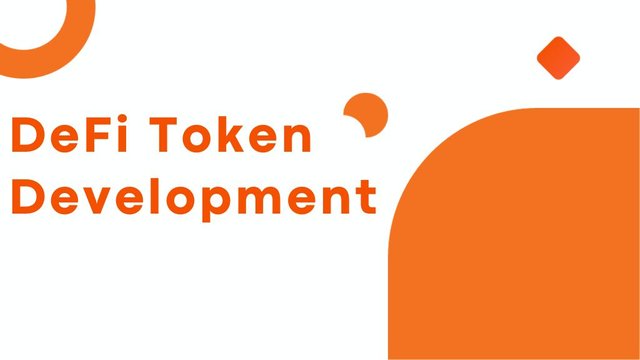
In the rapidly evolving landscape of blockchain technology and decentralized finance (DeFi), startups have the unique opportunity to shape the future of finance by creating their own DeFi tokens. DeFi token development is not only a means to secure funding but also a way to participate in the global movement towards decentralized financial systems. In this comprehensive guide, we will take you on a journey through the world of DeFi token development, from understanding the basics to launching your own successful token project.
Understanding the DeFi Ecosystem
Before diving into the intricacies of DeFi token development, it's essential to grasp the fundamentals of the DeFi ecosystem. DeFi, short for decentralized finance, represents a paradigm shift in traditional finance. It leverages blockchain technology to create open and permissionless financial systems that are accessible to anyone with an internet connection.
Startups entering the DeFi space often do so with the aim of providing innovative solutions to common financial problems. These solutions can range from decentralized lending and borrowing platforms to decentralized exchanges and yield farming protocols.
The Role of Tokens in DeFi
Tokens are the lifeblood of the DeFi ecosystem. They serve as the building blocks for decentralized applications (dApps) and platforms, enabling various functionalities such as governance, staking, and rewards distribution. Tokens can represent assets, utilities, or even ownership rights within a DeFi project.
Understanding the different types of tokens is crucial for startups:
- Utility Tokens: These tokens provide access to a product or service within a decentralized platform. For instance, the token might be required to pay transaction fees or access premium features.
- Governance Tokens: Governance tokens grant holders the power to influence decisions within a DeFi project. Token holders can vote on proposals and steer the direction of the project.
- Asset-Backed Tokens: Some DeFi tokens are backed by real-world assets, such as stablecoins pegged to the value of fiat currencies or cryptocurrencies.
- Yield Farming and Liquidity Provision Tokens: These tokens are rewarded to users who provide liquidity to DeFi protocols. They play a pivotal role in DeFi's liquidity ecosystem.
Planning Your DeFi Token Project
Identifying a Problem to Solve
Successful DeFi projects often start by identifying a specific problem or inefficiency in the existing financial system. Your startup should aim to address a pain point or provide a novel solution to gain a competitive edge.
Defining Tokenomics
Tokenomics refers to the economic design of your token. Key considerations include:
- Total supply: How many tokens will be created, and will there be a cap on the supply?
- Distribution: How will tokens be initially distributed, and what percentage will be allocated to various stakeholders?
- Incentives: What incentives will you offer to token holders, such as staking rewards or governance rights?
Choosing the Blockchain Platform
Selecting the right blockchain platform for your DeFi token is critical. Ethereum has been the dominant platform for DeFi, but other chains like Binance Smart Chain, Solana, and Polkadot offer compelling alternatives. Consider factors like scalability, security, and community support.
Smart Contract Development
Smart contracts are self-executing agreements with predefined rules and conditions. They are at the core of DeFi platforms. You'll need to develop robust, audited smart contracts to ensure the security and functionality of your token.
Security Audits
Security is paramount in the DeFi space, where vulnerabilities can lead to significant losses. Conduct thorough security audits of your smart contracts and seek professional assistance to identify and mitigate potential risks.
Launching Your DeFi Token
Liquidity Provision
To ensure your token gains traction, you'll need to provide liquidity on decentralized exchanges (DEXs). This involves adding your token to liquidity pools, allowing users to trade it. In return, you earn fees and rewards.
Community Building
Building a strong community around your DeFi token is essential. Engage with your users on social media, forums, and Discord channels. Encourage feedback and incorporate user suggestions.
Governance
If your project involves a governance token, set up a decentralized governance system that allows token holders to propose and vote on changes. This empowers the community to have a say in the project's development.
Challenges and Risks
While DeFi token development offers immense potential, it also comes with challenges and risks:
- Regulatory Compliance: Navigating the regulatory landscape can be complex. Seek legal counsel to ensure compliance with local regulations.
- Security: DeFi projects are prime targets for hackers. Security breaches can result in substantial losses. Always prioritize security.
- Market Volatility: The crypto market is highly volatile. Be prepared for price fluctuations and plan accordingly.
- Competition: The DeFi space is competitive. Differentiating your project and gaining user trust can be challenging.
Case Studies of Successful DeFi Token Projects
To inspire your startup journey, let's look at a few examples of DeFi token projects that have achieved significant success:
- Uniswap (UNI): Uniswap is a decentralized exchange that has its governance token, UNI. It has become a cornerstone of DeFi liquidity provision.
- Aave (AAVE): Aave is a lending and borrowing protocol with its governance token, AAVE, which is used for platform governance.
- Compound (COMP): Compound is another lending and borrowing platform with its governance token, COMP, giving users a say in protocol changes.
Looking Ahead
As the DeFi space continues to evolve, startups have an incredible opportunity to shape the future of finance through token development. By understanding the intricacies of DeFi, tokenomics, and embracing innovation while managing risks, your startup can be at the forefront of the decentralized financial revolution.
Remember that DeFi token development is a journey that requires continuous learning and adaptation. Stay informed, engage with the community, and keep innovating to make a lasting impact on the world of finance.
In conclusion, your startup's DeFi token project has the potential to unlock new possibilities and redefine the financial landscape. Seize this opportunity, and may your journey in DeFi be filled with success and innovation. Welcome to the future of finance!